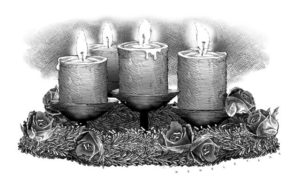December — how quickly we have moved into the month, and so imperceptibly that it makes no sense now to say, from there to here.
We saw no thresholds, we made no entrances.
In accordance with liturgical time, we have come to the end of the old year and the beginning of the new.
I try to keep track of these seasons.
In fact, when I listen to Vivaldi, as the violins progress from spring to summer to autumn to winter, I think of the parallel seasons of the spirit as well — Advent, Christmas, Lent, Easter and Ordinary Time.
And this without much effort because, apart from the fact that the soul speaks through music, “The Four Seasons” has an interior feel, in that Vivaldi intended it as companion to his poems.
In a mall, as though on cue, the wife and I enter a shop selling religious objects, and there purchase an “Advent wreath,” an arrangement of four candles (three purple and one pink) within a ring of flowers and leaves.
When we arrive home that night we will light one candle with a prayer and a reading of scriptural passages, mostly prophecies about the coming of the Messiah.
A good number of these readings come from Isaiah. In fact, the Gospel for the first Sunday of Lent especially mentions him.
Luke writes that “the word of God came to John the son of Zechariah in the desert.”
As a consequence, John went around the area of the Jordan, “proclaiming a baptism of repentance for the forgiveness of sins.”
John finds himself alluded to by the prophet Isaiah, “A voice of one crying out in the desert: ‘Prepare the way of the Lord, make straight his paths. Every valley shall be filled and every mountain and hill shall be made low. The winding roads shall be made straight, and the rough ways made smooth, and all flesh shall see the salvation of God.’”
Here, one does not contemplate the words of John the Baptist, a ragged man urging a life of discipline and sacrifice.
One comes here to shop and to eat, to gather the self again in, say, a coffee shop.
Mostly, one repairs to these places to release the coils that have wound up the mind and body.
But in the process one might give a thought to happiness, which we all seek, which I think the vapors of really good coffee should suggest.
And if one has a thing about philosophy, one might even agree or argue with St. Thomas Aquinas, who said that “God alone constitutes man’s happiness.”
If one sees that, outside, the sky has darkened, one can take this as a temporary happiness — an imperfect one, the only kind of happiness that the earth offers, according to St. Thomas — to be inside, in the words of Vivaldi in his poem on winter: “To rest contentedly beside the hearth, while those outside are drenched by pouring rain.”
Disclaimer: The comments uploaded on this site do not necessarily represent or reflect the views of management and owner of Cebudailynews. We reserve the right to exclude comments that we deem to be inconsistent with our editorial standards.

